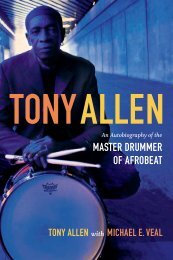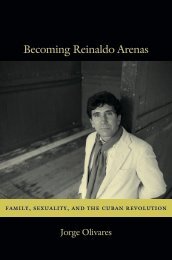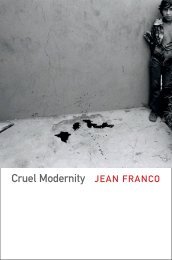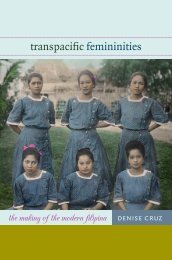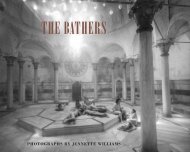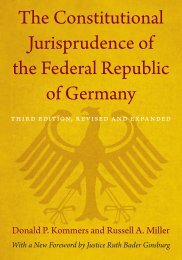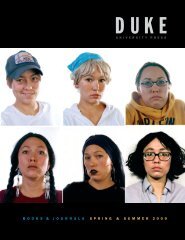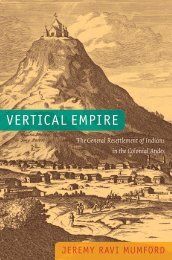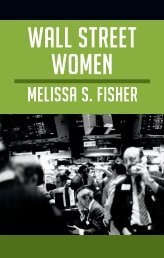Spring 2013 Catalog - Duke University Press
Spring 2013 Catalog - Duke University Press
Spring 2013 Catalog - Duke University Press
You also want an ePaper? Increase the reach of your titles
YUMPU automatically turns print PDFs into web optimized ePapers that Google loves.
Uncivil Youth<br />
Race, Activism, and Affirmative Governmentality<br />
soo ah kwon<br />
“Providing a model of activist ethnographic research, Soo Ah Kwon<br />
constructively engages with the activism of the youth of color whom she<br />
studies without oversimplifying the contradictory circumstances within<br />
which they work. Kwon respects their intellectual analyses and political<br />
contributions. At the same time, she demonstrates that youth organizing is<br />
often shaped by the very discourses that it seeks to resist. Uncivil Youth<br />
is a compelling examination of the intersections of youth organizing,<br />
governmentality, and the ‘nonprofit industrial complex.’”—ANDREA<br />
SMITH, author of Native Americans and the Christian Right: The Gendered<br />
Politics of Unlikely Alliances<br />
In Uncivil Youth, Soo Ah Kwon<br />
explores youth of color activism as<br />
linked to the making of democratic<br />
citizen-subjects. Focusing attention<br />
on the relations of power that inform<br />
the social and political practices of<br />
youth of color, Kwon examines how<br />
after-school and community-based<br />
programs are often mobilized to<br />
prevent potentially “at-risk” youth<br />
from turning to “juvenile delinquency”<br />
and crime. These sorts of strategic<br />
interventions seek to mold young<br />
people to become self-empowered<br />
and responsible citizens. Theorizing this mode of youth governance as<br />
“affirmative governmentality,” Kwon investigates the political conditions<br />
that both enable and limit youth of color from achieving meaningful<br />
change given the entrenchment of nonprofits in the logic of a neoliberal<br />
state. She draws on several years of ethnographic research with an<br />
Oakland-based, panethnic youth organization that promotes grassroots<br />
activism among its second-generation Asian and Pacific Islander<br />
members (ages 14 to 18). While analyzing the contradictions of the<br />
youth organizing movement, Kwon documents the genuine contributions<br />
to social change made by the young people with whom she<br />
worked in an era of increased youth criminalization and anti-immigrant<br />
legislation.<br />
Soo Ah Kwon is Assistant Professor of Asian American Studies and<br />
Human and Community Development at the <strong>University</strong> of Illinois,<br />
Urbana-Champaign.<br />
ASIAN AMERICAN STUDIES/ACTIVISM<br />
April 184 pages, 3 illustrations<br />
paper, 978–0–8223–5423–9, $22.95/£14.99<br />
cloth, 978–0–8223–5405–5, $79.95/£60.00<br />
cultural studies<br />
The Children of 1965<br />
On Writing, and Not Writing,<br />
as an Asian American<br />
min hyoung song<br />
“Min Hyoung Song makes a persuasive case for a return to deep reading:<br />
the careful, loving attention to the literary text, couched within a social<br />
and political consciousness. He reminds us of the beauty to be found<br />
within the pages of the Asian American novel, short story, and poem,<br />
as well as of the brilliant testimony embedded in those works, evidence<br />
of the experiences of both the children of 1965 and their parents. Song’s<br />
ambitious book not only surveys the growing field of contemporary Asian<br />
American literature, but is itself a milestone in Asian American literary<br />
history.”—VIET NGUYEN, author of Race and Resistance: Literature and<br />
Politics in Asian America<br />
Since the 1990s, a new cohort of Asian<br />
American writers has garnered criti-<br />
cal and popular attention. Many of its<br />
members are the children of Asians<br />
who came to the United States after<br />
the Immigration and Nationality Act<br />
of 1965 lifted long-standing restric-<br />
tions on immigration. This new<br />
generation encompasses writers as<br />
diverse as the graphic novelists Adrian<br />
Tomine and Gene Luen Yang, the short<br />
story writer Nam Le, and the poet<br />
Cathy Park Hong. Having scrutinized<br />
more than 100 works by emerging<br />
Asian American authors and interviewed several of them, Min Hyoung<br />
Song argues that collectively, their works push against existing ways<br />
of thinking about race, even as they demonstrate how race can facilitate<br />
creativity. Some of the writers eschew their identification as ethnic<br />
writers, while others embrace it as a means of tackling the uncertainty<br />
that many people feel about the near future. In the literature that they<br />
create, a number of the writers that Song discusses take on pressing<br />
contemporary matters such as demographic change, environmental<br />
catastrophe, and the widespread sense that the United States is in<br />
national decline.<br />
Min Hyoung Song is Associate Professor of English at Boston College.<br />
He is the author of Strange Future: Pessimism and the 1992 Los Angeles<br />
Riots, also published by <strong>Duke</strong> <strong>University</strong> <strong>Press</strong>, and editor of the Journal<br />
of Asian American Studies.<br />
ASIAN AMERICAN STUDIES/AMERICAN LITERATURE<br />
April 288 pages, 13 illustrations<br />
paper, 978–0–8223–5451–2, $23.95/£15.99<br />
cloth, 978–0–8223–5438–3, $84.95/£64.00<br />
23



